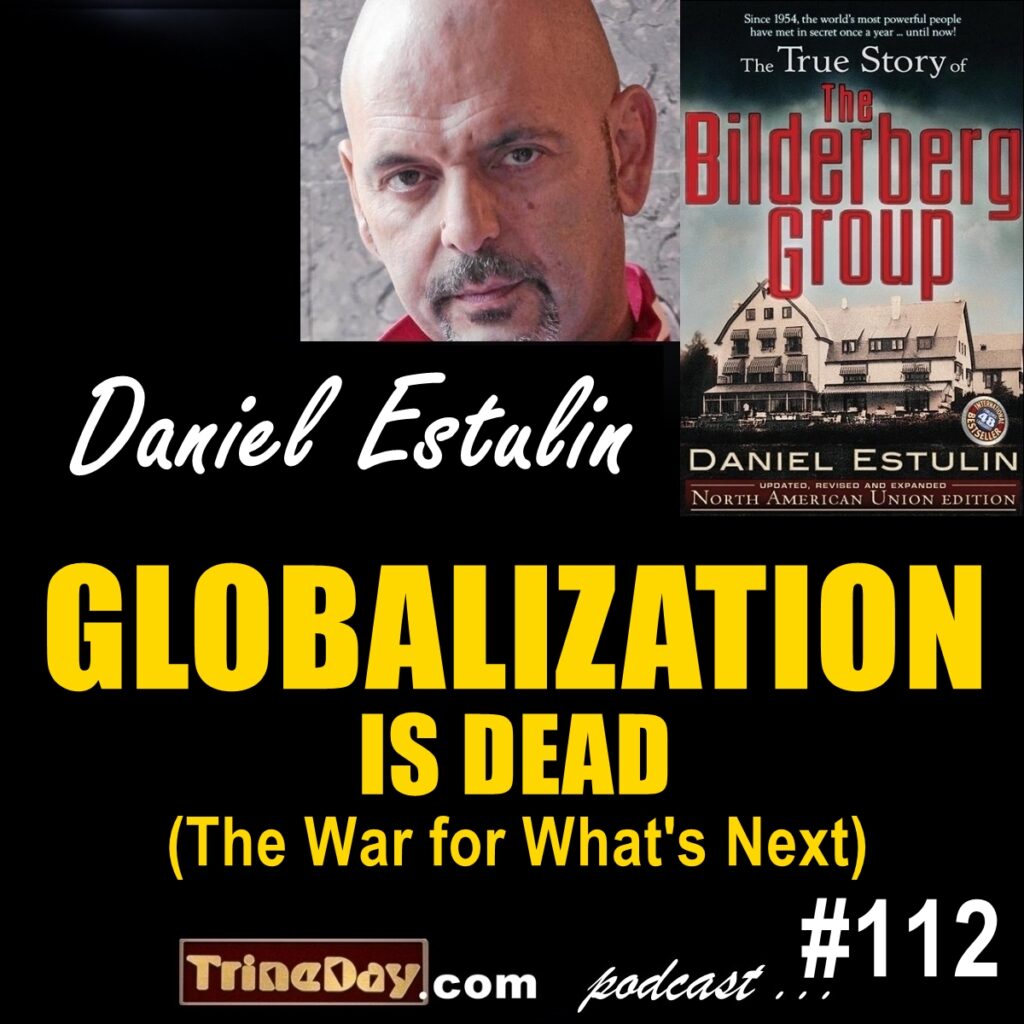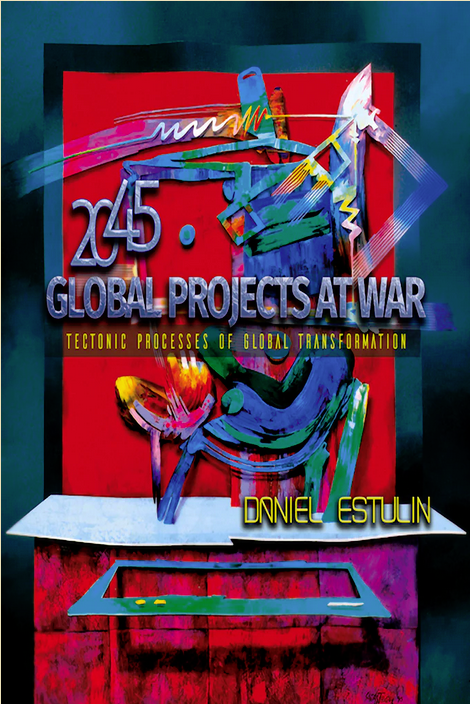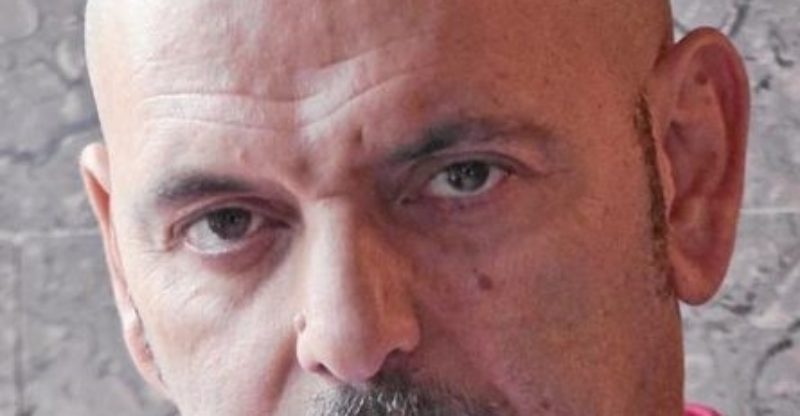The Journey 112. Daniel Estulin: Globalization is Dead (The War for What’s Next)
Publisher RA “Kris” Millegan talks with Daniel Estulin (author of THE TRUE STORY OF THE BILDERBERG GROUP; GLOBAL PROJECTS AT WAR: Tectonic Processes of Global Transformation; and other TrineDay books) about the death of Queen Elizabeth, inter-elite dealings spanning centuries, the death of globalization, and the regionalization of world economies. (Will America’s democratic institutions fail by 2045?)

Daniel: THE TRUE STORY OF THE BILDERBERG GROUP came out in Spain in 2005 and in the States, with TrineDay, I think in 2007. [Many] said, “It’s a crazy, wacky conspiracy theory.” Well, I think we can put quite a few checkmarks around that book. In Spain, it did 21 editions and 2.3 million copies sold, [then more worldwide] in 68 countries, translated into 42 languages. It’s been Number One in 21 countries in Europe.
Kris: By publishing this stuff that was being stopped from being published, it allows people to talk about it, instead of just letting this stuff fester and bubble up into [all kinds of things]. As you know, the psychological warfare uses conspiracy theory to push people one way or the other.

I wanted to talk to you today about sovereign countries. We hope our new book, ONE NATION UNDER BLACKMAIL by Whitney Webb, does as well as your BILDERBERG book.

We had Ari Ben-Menashe on one day, and he talked about how Israel didn’t want to get horn-swaggled into a peace agreement like they did with Carter, and that’s one reason they stepped up their espionage efforts on Clinton, and basically Lewinsky was kind of set in there to control Clinton so that he wouldn’t do some kind of a peace plan. So you have sovereign countries trying to do different things.
Now Russia. There’s a lot of different ethnic groups there and indigenous groups. Americans have been very ill-served by their news media and their education system as far as our understanding of the world outside of the United States.
Daniel: Plus the think tanks and the vaunted American foundations, whether the Hudson Institute, the American Enterprise Institute, RAND Corporation, it doesn’t matter. None of them really understand Russia. They do not understand the people. They do not understand our society. They don’t understand the way we think.
And one of the reasons the West hates Putin is because he’s a sovereign leader. And he talks about sovereign ideology. And that’s something that’s lacking the world over, including the United States. Russia needs an ideology in order to re-emerge as a civilization.
Because we’re not a country. That’s what most people don’t understand. They’re talking about, in the West, sanctions. Blockade. How do you blockage a country which is one-sixth of the world, size-wise? We’re not a country. We’re an empire civilization.
[The ideology we accept] will not be state-based. Meaning, it will not be forced upon every citizen via propaganda. A Russian person doesn’t accept the imposition of artificial rules and restrictions on a personal level but is always ready to follow the state and the interests of society in the name of common good. That’s what makes us different from the West. But we need to clearly understand why we should sacrifice ourselves and in the name of what.
[A recent Putin speech at an economic forum] was fundamental, for the most important part of it was the future of national ideology, which is the unacceptability of outside interference in determining the path of the Russian state and its people, and that’s what we’ve been seeing for so long, not only in Russia but the world over.
Putin not only referred to the actions of certain Western structures and organizations, but, most importantly, the imposition of Western globalist ideology.
Kris: In your most recent book, GLOBAL PROJECTS AT WAR, you look at the future and the conflict of different sovereign countries and ideologies and whatnot. You talk about the projection that the democratic institutions of the United States are going to fail by around 2040. 2045.

Daniel: We’ve gone from nation-states – what you could call Global 1.0, from Westphalia in 1648, to the late 1960s [when] The Bilderberg Group discussed dismantling the idea of nation-states and creating what they called One World Company, Limited. In other words, corporations that have more power than any government on the planet.
And today it’s easy to understand what that is. Whether we’re talking about Vanguard Group or Blackrock, we’re talking about corporations that have more power than most governments on the planet. Let’s call it Global 2.0.
So we’ve gone from an industrial economy, manufacturing physical things, to a post-industrial economy, which started in the 1970s, which is basically people playing with numbers and speculating on computer screens, producing nothing but zeros and ones.
And now we’re going past that to the Trans-industrial Economy. That’s artificial intelligence. Robotics. Virtual reality. Distance learning. Virtual contracts. All that kind of stuff. And Covid in great part helped propel that.
The idea of globalization is dead. We can see that with the sanctions the world over. The rules-based order, based on the rules of the Western world, as Putin said – who made those rules? The West. We [Russians] didn’t make those rules. And most of the world, 85 percent of the world, does not agree with them.
The rules of the West are crumbling around us. So we’re coming to the next stage, which is the regionalization of global economies. In fact, Brexit and BRICS, these were two attempts to regionalize global economies.
And for a region to work, you need a population base between 300 and 500 million people. I talk about this in GLOBAL PROJECTS AT WAR. The war in Europe is to determine what this post-crisis world is going to look like.









